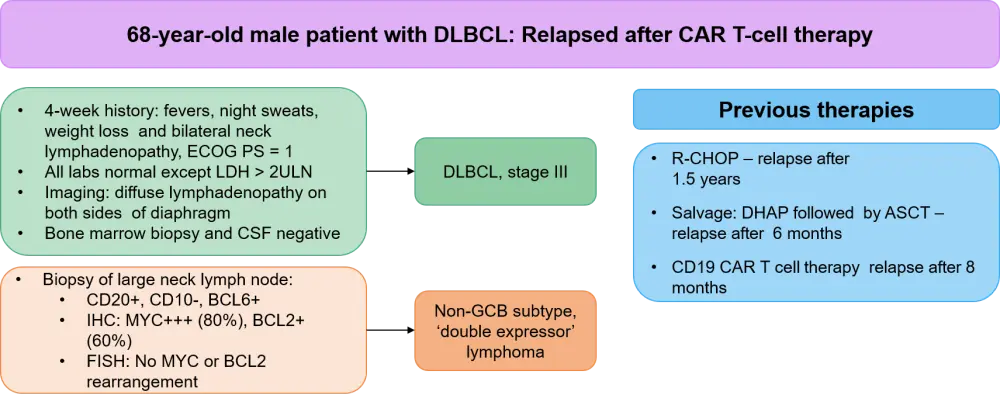All content on this site is intended for healthcare professionals only. By acknowledging this message and accessing the information on this website you are confirming that you are a Healthcare Professional. If you are a patient or carer, please visit the Lymphoma Coalition.
The lym Hub website uses a third-party service provided by Google that dynamically translates web content. Translations are machine generated, so may not be an exact or complete translation, and the lym Hub cannot guarantee the accuracy of translated content. The lym and its employees will not be liable for any direct, indirect, or consequential damages (even if foreseeable) resulting from use of the Google Translate feature. For further support with Google Translate, visit Google Translate Help.
The Lymphoma & CLL Hub is an independent medical education platform, sponsored by AbbVie, BeOne Medicines, Johnson & Johnson, Miltenyi Biomedicine, Nurix Therapeutics, Roche, Sobi, and Thermo Fisher Scientific and supported through educational grants from Bristol Myers Squibb, Lilly, and Pfizer. Funders are allowed no direct influence on our content. The levels of sponsorship listed are reflective of the amount of funding given. View funders.
Now you can support HCPs in making informed decisions for their patients
Your contribution helps us continuously deliver expertly curated content to HCPs worldwide. You will also have the opportunity to make a content suggestion for consideration and receive updates on the impact contributions are making to our content.
Find out more
Create an account and access these new features:
Bookmark content to read later
Select your specific areas of interest
View lymphoma & CLL content recommended for you
Challenges in the management and treatment of patients with relapsed/refractory DLBCL
Featured:
The virtual Lymphoma Hub Satellite Symposium at the European School of Haematology (ESH)’s 2nd How to Diagnose and Treat: Lymphoma conference saw a panel of international experts come together to discuss how to manage patients with relapsed and/or refractory (R/R) lymphoma. Kieron Dunleavy, George Washington University Cancer Center, Washington, US, and Marie José Kersten, Amsterdam UMC, Amsterdam, NL, discussed the progress being made in the field of R/R diffuse large B-cell lymphoma (DLBCL). Below you will find their perspectives as presented at the symposium.
Patient case
The two panelists outlined their approaches to treating a distinct patient case (Figure 1) while highlighting the emerging strategies in the R/R DLBCL setting across Europe and the US.
Figure 1. R/R DLBCL patient case1

US perspective: Kieron Dunleavy
Kieron Dunleavy began with a summary of what he considers to be feasible next steps for the patient following relapse to chimeric antigen receptor (CAR) T-cell therapy. He outlined recently approved agents and combination regimens, as well as therapies being evaluated in clinical trials. Dunleavy concluded with an emphasis on prognostic techniques, stressing the need for a biopsy to determine the patient’s CD19 expression profile. In terms of therapeutic approach, he suggested enrolling the patient onto a clinical trial evaluating novel bispecific antibodies.
Take part in the survey and watch Kieron Dunleavy’s presentation below.
Satellite Symposium | Patient with R/R DLBCL— US perspective
European perspective: Marie José Kersten
Marie José Kersten opened with a comprehensive overview of the pivotal clinical trials evaluating CAR T-cell treatments for DLBCL. She then moved on to explain the most widely understood mechanisms of resistance to CD19-directed CAR T-cell therapy. This introduction helped to paint a clearer picture of the patient case, explaining why a proportion of patients who receive CAR T-cell therapy eventually relapse. Marie José Kersten highlighted the potential benefit of a second infusion of CAR T cells, as was investigated in a cohort of patients from the ZUMA-1 study.
After outlining a number of novel CAR T constructs, she proceeded to discuss non-CAR T-based therapies and relevant clinical trial opportunities for the patient. These included studies evaluating bispecific antibodies, including epcoritamab and blinatumomab, and the CDK9 inhibitor AZD4573.
Kersten also pointed out the discrepancies in access to novel drugs between the US and Europe, and the inter-country variations within Europe.
Watch Marie José Kersten’s presentation below.
Satellite Symposium | Patient with R/R DLBCL— European perspective
Conclusion
Despite the encouraging clinical outcomes demonstrated by CAR T-cell therapies in patients with DLBCL, a proportion of patients do not respond to CAR T-cell therapy, or eventually relapse, as in the selected patient case. There are a number of exciting novel agents in clinical trials that promise to improve the outlook of patients with heavily pretreated DLBCL. Both panelists were in consensus that participation in clinical trials is the optimal approach for managing patients who have exhausted other treatment strategies, including CAR T-cell therapy.
References
Please indicate your level of agreement with the following statements:
The content was clear and easy to understand
The content addressed the learning objectives
The content was relevant to my practice
I will change my clinical practice as a result of this content


 Kieron Dunleavy
Kieron Dunleavy Marie José Kersten
Marie José Kersten